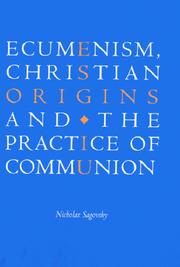| Listing 1 - 10 of 27 | << page >> |
Sort by
|
Book
ISBN: 3791726773 9783791726779 9783791770727 Year: 2015 Volume: 40 Publisher: Regensburg Pustet
Abstract | Keywords | Export | Availability | Bookmark
 Loading...
Loading...Choose an application
- Reference Manager
- EndNote
- RefWorks (Direct export to RefWorks)
Book
ISBN: 9782204134675 2204134678 Year: 2019 Volume: 7 Publisher: Paris Les Éditions du Cerf
Abstract | Keywords | Export | Availability | Bookmark
 Loading...
Loading...Choose an application
- Reference Manager
- EndNote
- RefWorks (Direct export to RefWorks)
À l'heure ou le pape François veut décentraliser Rome, voici l'étude qui livre des perspectives sans précédent sur la réconciliation entre les Églises catholique et orthodoxe. Un traité sur la communion vécue." Synodalité ". Le mot, courant dans le vocabulaire orthodoxe, connaît un renouveau étonnant dans le langage catholique, notamment à travers l'enseignement du pape François, appelant de ses voeux, sur le modèle " de nos frères orthodoxes ", une Église plus synodale." Collégialité ". Le terme désigne habituellement une doctrine centrale du concile Vatican II, qui vise à associer les évêques au pouvoir dans l'Église, afin d'équilibrer le dogme de la primauté romaine.Collégialité et synodalité : catholiques et orthodoxes parlent-ils de la même chose ? Cette étude tente de confronter les deux notions, en vue d'une compréhension commune de la place des évêques au sein de l'Église entière. Allant plus loin qu'une simple comparaison stérile ou polémique, Amphilochios Miltos, lui-même orthodoxe, essaye de comprendre la collégialité catholique dans tous ses aspects, et cherche un langage commun dans la tradition théologique que les deux Églises partagent.Une contribution originale et puissante à la question brûlante de ce qu'est l'Église et de ce que doit être son avenir.
Book
ISBN: 2227300256 9782227300255 Year: 1981 Publisher: Paris Centurion
Abstract | Keywords | Export | Availability | Bookmark
 Loading...
Loading...Choose an application
- Reference Manager
- EndNote
- RefWorks (Direct export to RefWorks)
Book
ISBN: 9788820984083 8820984083 Year: 2010 Volume: 59 Publisher: Città del Vaticano Libreria Editrice Vaticana
Abstract | Keywords | Export | Availability | Bookmark
 Loading...
Loading...Choose an application
- Reference Manager
- EndNote
- RefWorks (Direct export to RefWorks)
Book
ISBN: 3491703581 Year: 2002 Publisher: Düsseldorf Patmos
Abstract | Keywords | Export | Availability | Bookmark
 Loading...
Loading...Choose an application
- Reference Manager
- EndNote
- RefWorks (Direct export to RefWorks)
Book
ISBN: 9782204092661 2204092665 9782227481862 9782728913756 2728913757 2227481862 Year: 2010 Publisher: Montrouge Bayard
Abstract | Keywords | Export | Availability | Bookmark
 Loading...
Loading...Choose an application
- Reference Manager
- EndNote
- RefWorks (Direct export to RefWorks)
Book
ISBN: 3870881429 9783870881429 Year: 1976 Volume: 39 Publisher: Paderborn Bonifacius
Abstract | Keywords | Export | Availability | Bookmark
 Loading...
Loading...Choose an application
- Reference Manager
- EndNote
- RefWorks (Direct export to RefWorks)
Book
ISBN: 2852444003 9782852444003 Year: 1980 Publisher: Paris Téqui
Abstract | Keywords | Export | Availability | Bookmark
 Loading...
Loading...Choose an application
- Reference Manager
- EndNote
- RefWorks (Direct export to RefWorks)
Book
ISBN: 8712232130 9788712232131 Year: 1984 Publisher: København Gad
Abstract | Keywords | Export | Availability | Bookmark
 Loading...
Loading...Choose an application
- Reference Manager
- EndNote
- RefWorks (Direct export to RefWorks)

ISBN: 9780511487828 9780521772693 9780521090537 0511010389 9780511010385 0511034555 9780511034558 0511487827 0521772699 1107119731 9781107119734 0521090539 0511151411 9780511151415 1280421320 9781280421327 0511049803 9780511049804 0511172583 9780511172588 0511310617 9780511310614 Year: 2000 Publisher: Cambridge New York Cambridge University Press
Abstract | Keywords | Export | Availability | Bookmark
 Loading...
Loading...Choose an application
- Reference Manager
- EndNote
- RefWorks (Direct export to RefWorks)
The theology of communion, or Koinonia, has been at the centre of the ecumenical movement for more than thirty years. It is central to the self-understanding of the Anglican, Roman Catholic and Orthodox Churches, and has been prominent in the work of the World Council of Churches. This book, based on the 1996 Hulsean Lectures, examines the significance of Koinonia for contemporary ecumenical theology, tracing the development of contemporary understanding in critical engagement with the thoughts of Plato, Aristotle, the Hebrew Scriptures, the New Testament, the Cappadocian Fathers and Augustine. In each case, reflection on community life is related to actual communities in which texts were produced. The importance of conflict and the place of politics for the Koinonia that constitutes the Christian churches is a major theme throughout. Communion is seen as a gift to be received and a discipline to be cultivated in the continuing practice of ecumenism.
| Listing 1 - 10 of 27 | << page >> |
Sort by
|

 Search
Search Feedback
Feedback About UniCat
About UniCat  Help
Help News
News